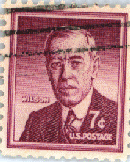FRtR > Outlines > American History (1990) > Chapter Seven > Conflict abroad, social change at home (1/13)
An Outline of American History (1990)
Chapter Seven
Conflict abroad, social change at home (1/13)
Next Page >
"We must be the great arsenal
of democracy".
Franklin D. Roosevelt
Message to Congress, January 6, 1941
To the American public of 1914, the outbreak of
war in Europe came as a shock. At first the conflict seemed
remote, but its economic and political effects were soon felt. By
1915 American industry, which had been mildly depressed, was
prospering again with munitions orders from the western Allies.
Both sides were using propaganda to arouse public passions in
America, and both Britain and Germany were committing acts
against American shipping on the high seas that brought sharp
protests from the Wilson Administration . But
disputes between
America and Germany moved more and more to the foreground.
In February 1915, German military leaders announced that
they would destroy all merchantmen in the waters around the
British Isles. President Wilson warned that the United States would
not forsake its traditional right to trade on the high seas and
declared that the nation would hold Germany to
"strict accountability" for the loss of American vessels or lives.
Soon afterward, in the spring of 1915, when the British liner Lusitania was
sunk
with nearly 1,200 people aboard, 128 of them Americans, indignation reached
fever pitch.
 Wartime stresses made for inconsistencies in President
Wilson's policies. Although no American President has ever been
more dedicated to peace, Wilson, observing German ruthlessness,
particularly in submarine warfare, was convinced that a German
victory would bring the dominance of militarism in Europe and
endanger American security.
Wartime stresses made for inconsistencies in President
Wilson's policies. Although no American President has ever been
more dedicated to peace, Wilson, observing German ruthlessness,
particularly in submarine warfare, was convinced that a German
victory would bring the dominance of militarism in Europe and
endanger American security.
On May 4, 1916, the German government pledged that its
submarine warfare would be limited in accordance with American
demands, and the problem appeared to be solved. Wilson was
able to win reelection that year, partly on the strength of his party's
slogan, "He kept us out of war." In January 1917 in a speech
before the Senate he called for a "peace without victory," which,
he said, was the only kind of peace that could last.
Next Page >
 Wartime stresses made for inconsistencies in President
Wilson's policies. Although no American President has ever been
more dedicated to peace, Wilson, observing German ruthlessness,
particularly in submarine warfare, was convinced that a German
victory would bring the dominance of militarism in Europe and
endanger American security.
Wartime stresses made for inconsistencies in President
Wilson's policies. Although no American President has ever been
more dedicated to peace, Wilson, observing German ruthlessness,
particularly in submarine warfare, was convinced that a German
victory would bring the dominance of militarism in Europe and
endanger American security.